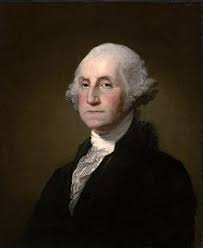


George Washington was a leader of the Continental Army in the American Revolution, and was the first to become U.S. president.
George Washington was born on February 22, 1732, in West moreland County, Virginia. Washington served as a general and commander-in-chief of the colonial armies during the American Revolution, and later became the first president of the United States, serving from 1789 to 1797. He died on December 14, 1799, in Mount Vernon, Virginia.
Early Life and Family
George Washington could trace his family's presence in North America to his great-grandfather, John Washington, who migrated from England to Virginia. The family held some distinction in England and was granted land by Henry VIII. Much of the family’s wealth was lost during the Puritan revolution and in 1657 George’s grandfather, Lawrence Washington, migrated to Virginia. Little information is available about the family in North America until George’s father, Augustine, was born in 1694.
Augustine Washington was an ambitious man who acquired land and slaves, built mills, and grew tobacco. For a time, he had an interest in opening iron mines. He married his first wife, Jane Butler and they had three children. Jane died in 1729 and Augustine married Mary Ball in 1731. George was the eldest of Augustine and Mary’s six children, all of which survived into adulthood. The family lived on Pope's Creek in Westmoreland County, Virginia. They were moderately prosperous members of Virginia's "middling class."
Augustine moved the family up the Potomac River to another Washington family home, Little Hunting Creek Plantation, (later renamed Mount Vernon) in 1735 and then moved again in 1738 to Ferry Farm on the Rappahannock River, opposite Fredericksburg, Virginia, where George Washington spent much of his youth.
Education
Little is known about George Washington's childhood, which fostered many of the fables later biographers manufactured to fill in the gap. Among these are the stories that Washington threw a silver dollar across the Potomac and after chopping down his father's prize cherry tree, he openly confessed to the crime. It is known that from age seven to fifteen, George was home schooled and studied with the local church sexton and later a schoolmaster in practical math, geography, Latin and the English classics. But much of the knowledge he would use the rest of his life was through his acquaintance with backwoodsmen and the plantation foreman. By his early teens, he had mastered growing tobacco, stock raising and surveying. George Washington’s father died when he was 11 and he became the ward of his half-brother, Lawrence, who gave him a good upbringing. Lawrence had inherited the family's Little Hunting Creek Plantation and married Anne Fairfax, the daughter of Colonel William Fairfax, patriarch of the well to do Fairfax family. Under her tutorage, George was schooled in the finer aspects of colonial culture. In 1748, when he was 16, George traveled with a surveying party plotting land in Virginia’s western territory. The following year, aided by Lord Fairfax, Washington received an appointment as official surveyor of Culpeper County. For two years he was very busy surveying the land in Culpeper, Frederick and Augusta counties. The experience made him resourceful and toughened his body and mind. It also piqued his interest in western land holdings, an interest that endured throughout his life with speculative land purchases and a belief that the future of the nation lay in colonizing the West. In July 1752, George Washington's brother, Lawrence, died of tuberculosis making him the heir apparent of the Washington lands. Lawrence’s only child, Sarah, died two months later and Washington became the head of one of Virginia's most prominent estates, Mount Vernon. He was 20 years old. Throughout his life, he would hold farming as one of the most honorable professions and he was most proud of Mount Vernon. He would gradually increase his landholdings there to about 8,000 acres.
Pre-Revolutionary Military Career
In the early 1750s, France and Britain were at peace. However, the French military had begun occupying much of the Ohio Valley, protecting the King's land interests and fur trappers and French settlers. But the border lands of this area were unclear and prone to dispute between the two countries. Washington showed early signs of natural leadership and shortly after Lawrence's death, Virginia's Lieutenant Governor, Robert Dinwiddie, appointed Washington adjutant with a rank of major in the Virginia militia. French and Indian War On October 31, 1753, Dinwiddie sent Washington to Fort LeBoeuf, at what is now Waterford, Pennsylvania, to warn the French to remove themselves from land claimed by Britain. The French politely refused and Washington made a hasty ride back to Williamsburg, Virginia's colonial capitol. Dinwiddie sent Washington back with troops and they set up a post at Great Meadows. Washington's small force attacked a French post at Fort Duquesne killing the commander, Coulon de Jumonville, and nine others and taking the rest prisoners. The French and Indian War had begun. The French counterattacked and drove Washington and his men back to his post at Great Meadows (later named "Fort Necessity.") After a full day siege, Washington surrendered and was soon released and returned to Williamsburg, promising not to build another fort on the Ohio River. Though a little embarrassed at being captured, he was grateful to receive the thanks from the House of Burgesses and see his name mentioned in the London gazettes. Washington was given the honorary rank of colonel and joined British General Edward Braddock's army in Virginia in 1755. The British had devised a plan for a three-prong assault on French forces attacking Fort Duquesne, Fort Niagara and Crown Point. During the encounter, the French and their Indian allies ambushed Braddock, who was mortally wounded. Washington escaped injury with four bullet holes in his cloak and two horses shot out from under him.
~~ Never give up and keep pushing forward is the lessons that can not be taught by anyone but yourself. ~~